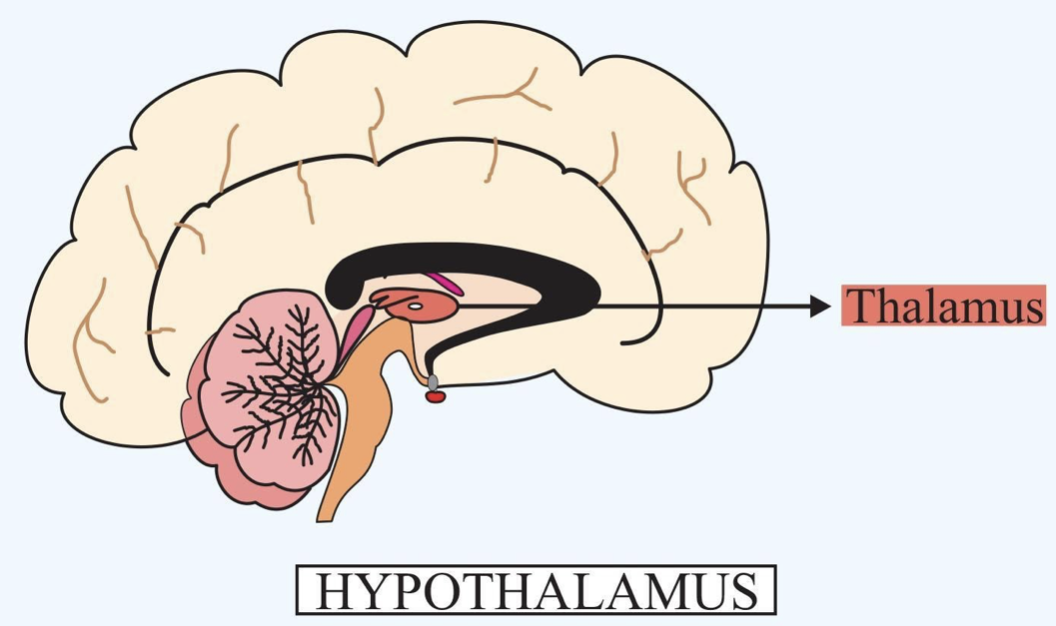
Which part of our central neural system acts as a master clock?
Answer
569.7k+ views
Hint: In vertebrate animals, including humans, the master clock is a group of about 20,000 nerve cells or neurons that form a structure called the suprachiasmatic nucleus, or SCN. The SCN is located in a part of the brain, which governs the functioning of the pituitary gland and nervous system.
Complete answer:
Hypothalamus acts as a master clock in the human body. The master circadian clock that regulates 24-hour cycles throughout our body. It is a group of about 2000 neurons that form a structure called the suprachiasmatic nucleus, or SCN which is located on the hypothalamus of the brain.

The SCN is made up of two tiny clusters of several thousand nerve cells that tell time based on external cues, such as light and darkness. SCN regulates sleep, metabolism, and hormone production. Hypothalamus is the glandular floor of the diencephalon of the vertebrate brain. It has both nervous and endocrine goals. It controls emotional responses, regulates body temperature, and water balance, and arouses hunger drive. It serves as a link between the nervous and endocrine systems.
Additional Information:
- Hypothalamus receives inputs from other parts of the brain, and also from hormones in the blood. In response to these inputs, it secretes several regulating hormones that regulate the release of pituitary hormones.
- The neurosecretory cells of the hypothalamus secrete three major groups of hormones, namely regulating hormones, oxytocin, and vasopressin.
- Regulating hormones are then transported to the adenohypophysis by blood. Oxytocin and vasopressin are transported to the neurohypophysis.
- In neurohypophysis, they are stored in axon terminals. When the hypothalamus gets excited by appropriate stimuli, the impulses would be transmitted to the axon endings of neurosecretory cells.
Note:
- The impulses cause the release of the speed hormones from axon terminals to blood.
- Blood will carry them to target sites. Hypothalamic regulating hormones governs the production of Pituitary Tropic hormones.
- They are two kinds; releasing hormones and inhibiting hormones.
Complete answer:
Hypothalamus acts as a master clock in the human body. The master circadian clock that regulates 24-hour cycles throughout our body. It is a group of about 2000 neurons that form a structure called the suprachiasmatic nucleus, or SCN which is located on the hypothalamus of the brain.

The SCN is made up of two tiny clusters of several thousand nerve cells that tell time based on external cues, such as light and darkness. SCN regulates sleep, metabolism, and hormone production. Hypothalamus is the glandular floor of the diencephalon of the vertebrate brain. It has both nervous and endocrine goals. It controls emotional responses, regulates body temperature, and water balance, and arouses hunger drive. It serves as a link between the nervous and endocrine systems.
Additional Information:
- Hypothalamus receives inputs from other parts of the brain, and also from hormones in the blood. In response to these inputs, it secretes several regulating hormones that regulate the release of pituitary hormones.
- The neurosecretory cells of the hypothalamus secrete three major groups of hormones, namely regulating hormones, oxytocin, and vasopressin.
- Regulating hormones are then transported to the adenohypophysis by blood. Oxytocin and vasopressin are transported to the neurohypophysis.
- In neurohypophysis, they are stored in axon terminals. When the hypothalamus gets excited by appropriate stimuli, the impulses would be transmitted to the axon endings of neurosecretory cells.
Note:
- The impulses cause the release of the speed hormones from axon terminals to blood.
- Blood will carry them to target sites. Hypothalamic regulating hormones governs the production of Pituitary Tropic hormones.
- They are two kinds; releasing hormones and inhibiting hormones.
Recently Updated Pages
Master Class 11 Computer Science: Engaging Questions & Answers for Success

Master Class 11 Business Studies: Engaging Questions & Answers for Success

Master Class 11 Economics: Engaging Questions & Answers for Success

Master Class 11 English: Engaging Questions & Answers for Success

Master Class 11 Maths: Engaging Questions & Answers for Success

Master Class 11 Biology: Engaging Questions & Answers for Success

Trending doubts
One Metric ton is equal to kg A 10000 B 1000 C 100 class 11 physics CBSE

There are 720 permutations of the digits 1 2 3 4 5 class 11 maths CBSE

Discuss the various forms of bacteria class 11 biology CBSE

Draw a diagram of a plant cell and label at least eight class 11 biology CBSE

State the laws of reflection of light

Explain zero factorial class 11 maths CBSE




